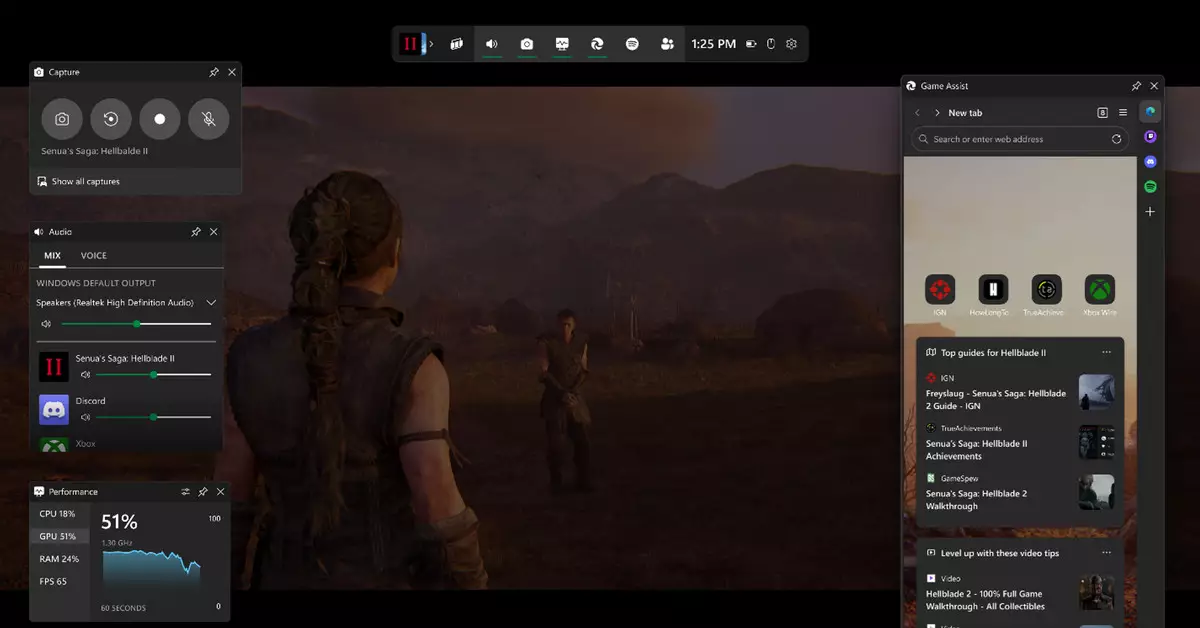In a bold move to enhance the gaming experience for Windows 11 users, Microsoft recently unveiled the beta version of Game Assist, a groundbreaking in-game overlay powered by the Microsoft Edge browser. As the tech landscape evolves, so does the gaming community’s demand for innovative tools that streamline gameplay and provide immediate access to essential information. Game Assist aims to address these needs by acting as a “game-aware” assistant, offering players real-time tips, guides, and other useful content relevant to their current gaming session. This article explores the functionalities, requirements, and future potential of Microsoft’s latest feature.
The design of Game Assist is particularly clever, as it integrates directly within the Microsoft Game Bar—a feature familiar to most gamers. This overlay dynamically identifies the game being played and curates a list of related resources using Edge’s capabilities. For players engaged with popular titles like Baldur’s Gate 3 or Diablo IV, this feature promises to simplify the snag of searching for guides and tutorials online mid-game. The convenience of having a dedicated tool that can pop up relevant content instantaneously is a refreshing change in a landscape where multitasking often disrupts the immersive experience of gaming.
One of the standout attributes of Game Assist is its integration with the user’s Edge profile. This means that vital data, such as autofill settings, bookmarks, and even cookies, are readily available without needing to log in again to various gaming sites. This feature not only saves time but also enhances continuity for players who might be deep into complex games, which often require jumping between gameplay and web resources for assistance. This thoughtful integration showcases Microsoft’s keenness to leverage its existing products to deliver a more cohesive and user-friendly experience.
Understanding that user feedback is crucial for the success of any new feature, Microsoft has established several channels through which players can share their experiences with Game Assist. Users can submit feedback directly through the overlay by navigating to the settings, or they can engage with a broader community through platforms such as r/MicrosoftEdge and X (formerly known as Twitter). This openness to feedback not only fosters a sense of community but also positions Microsoft as a responsive developer ready to tailor its services based on real user experiences.
While Game Assist is an exciting development, it currently has limitations worth noting. Presently, it supports only mouse and keyboard inputs, which may be a drawback for players who prefer game controllers. Microsoft has acknowledged this and is reportedly working on incorporating support for handhelds and gamepads, indicating a commitment to making the tool accessible to a wider audience. Furthermore, the feature’s support for additional games is something that Microsoft plans to roll out gradually, ensuring that players have the resources they need for an ever-growing library of titles.
For users eager to test this new feature, Microsoft has streamlined the setup process. Players must ensure they are running Windows 11 with the latest version of the Game Bar. Additionally, integrating Microsoft Edge Beta as the default browser is essential, which involves a simple process in system settings. The expectation is that those who have engaged with the Edge Insider builds will find the transition to Game Assist straightforward. However, it is admittedly necessary for users unfamiliar with the Edge Beta environment to undergo a series of steps to enable the feature.
Microsoft’s Game Assist is a promising addition to the gaming ecosystem that aims to reduce friction during gameplay by delivering information at the player’s fingertips. As gaming continues to grow as a multi-faceted experience encompassing strategy guides, video tutorials, and community forums, the need for such tools becomes increasingly paramount. By leveraging the capabilities of Edge and tapping into user feedback, Microsoft is not merely keeping up with the trends but is carving out its path as a leader in gaming innovation. As more games are supported and additional features are rolled out, Game Assist could very well become an indispensable companion for gamers everywhere.


Leave a Reply